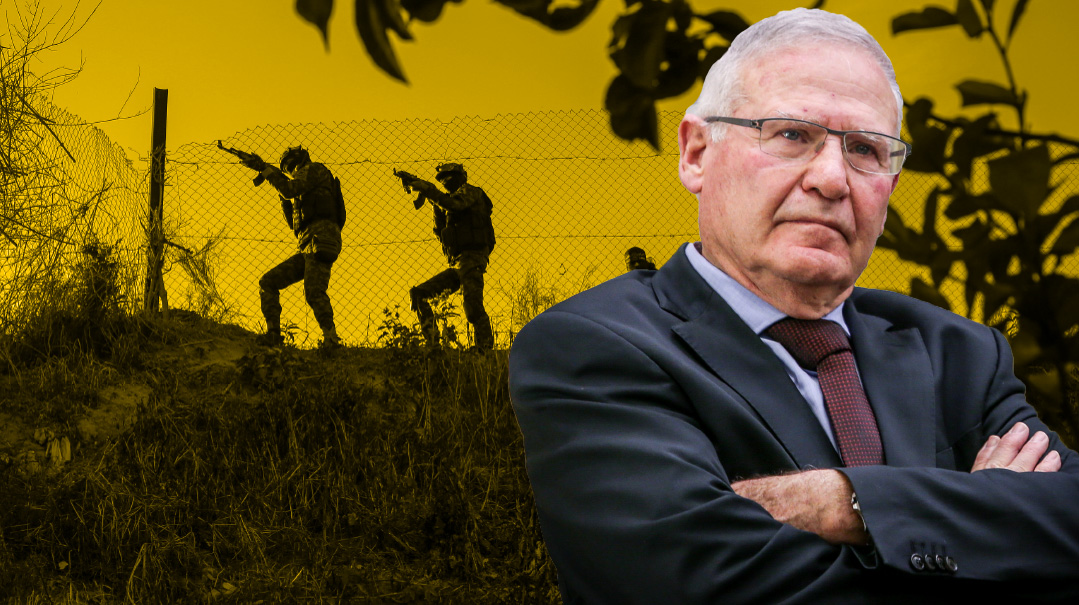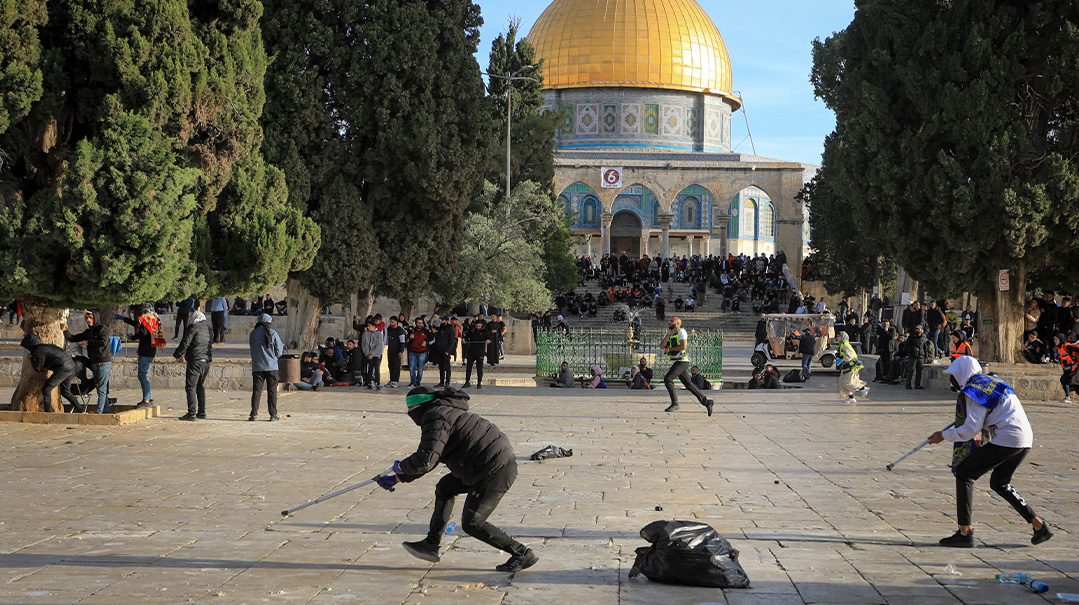Fire Control

Former Intel Chief Gen. Amos Yadlin on the endless rounds of Gaza conflict

H
amas and Hezbollah are clearly on the move against Israel, instigating a terror wave that has claimed 14 lives and launching missiles from north and south, as well as inciting violence on Har Habayis — but so far, the country’s security establishment has taken only measured responses.
While that has drawn criticism in some quarters, and calls for tougher actions, at least one former defense apparatus figure is praising the policy — Major General Amos Yadlin, former head of the IDF military intelligence directorate.
In a conversation with Mishpacha, Yadlin offers his assessment: “Israel is not headed toward a military operation in Gaza.”
It’s not as if there hasn’t been sufficient provocation. A missile was fired from Lebanon on Sunday night that landed in an open area near Kibbutz Matzuva in the western Galil. In retaliation, the IDF shelled the launch area for an hour and half, firing 50 shells, and the Lebanese side did not expect such a forceful response.
In addition, over the week of Pesach, seven rockets were fired from Gaza into Israel, some of which landed in open areas or in Gaza itself. The Southern Command advised the political echelon against retaliatory strikes in Gaza, reasoning that stopping the entrance of workers from Gaza would be more effective than another strike.
On Motzaei Shabbos, the security establishment decided to close the Erez crossing, preventing some 1,200 Palestinian workers with worker visas from entering the country. In a situation assessment held on Sunday evening, it was decided to continue those sanctions until the missile fire stops.
The grave disturbances that occurred at the Temple Mount were overwhelmingly instigated by Arab residents of East Jerusalem. The vast majority of Palestinians from Judea and Samaria who visited the al-Aqsa Mosque played little part in the riots. Defense officials say the situation in the East Jerusalem sector is highly concerning and will have to be dealt with before it gets out of hand.
Police have identified a wave of calls on social media to participate in a Hamas show of force at the Temple Mount this Friday, the last day of Ramadan. Police officials say that Hamas incitement of disturbances in Arab Israeli cities is also on the rise.
In Judea and Samaria, despite the incidents on the Temple Mount, order has been largely preserved. For this reason, hundreds of Judea and Samaria Palestinians with work visas were allowed to continue entering the country to work as usual. Nevertheless, on Monday morning, the IDF announced the mobilization of six reserve battalions (2,000 troops) for security purposes.
The Northern and Southern Commands have been on high alert the past two weeks, with defense officials saying that if the political echelon makes the decision, the IDF will embark on extensive operations on both the fronts in Gaza and in Lebanon. The sources added that since Guardian of the Walls, the “target banks” of the Gaza division and the Northern Command have been expanded and brought up to date.
But Amos Yadlin cautions that neither side has an interest in ratcheting up attacks, and insists a new IDF operation in Gaza is not on the horizon.
Even though Israel targeted a Hamas facility for the manufacture of precision-guided missiles last week?
“What you’re saying is absolutely correct. Israel has hit Hamas hard in strategic targets. We have two directions of action. On the one hand, the security establishment is aware that Hamas carried out arrests of those responsible for the missile fire in recent days. For this reason, Israel leaned toward accepting Hamas’s assurances that they have no interest in an escalation. But it turns out that in reality, Hamas was actively involved in the missile fire, even if it left the dirty work to Islamic Jihad. This was much more than a tactical event. Israel attacked vital enemy targets.”
How can Hamas expect to get away with such obvious lies?
“Hamas has one, very clear objective, to rebuild Gaza. The problem is that it’s under constant pressure from other elements such as Islamic Jihad, which threaten to exert force without its approval. So Hamas allows them to let off some steam. Of course, Israel isn’t interested in these details. Hamas is the sovereign power in the Strip, and it has to take responsibility for the territory under its control. That’s why Israel attacked Hamas facilities for the production of chemical propellants and precision-guided missiles, as you noted.”
Hamas has taken a blow, then?
“As the sovereign in Gaza, Hamas is paying a heavy price for missile fire against Israel. To the best of my knowledge, it is not directly responsible for the fire. But make no mistake, it’s very satisfied with every incident of rocket fire. From their perspective, a single successful mission against Israel is enough. The quiet is deceptive, and it doesn’t detract from Hamas’s determination to continue the struggle with Israel.”

Is Hamas interested in forcing an end to the struggle?
“Obviously, to the extent of their ability. Israel is also interested in a decisive outcome. The problem is that this would involve a course of action Israel doesn’t want to take — namely conquering Gaza. And that’s why we have this back-and forth of talks as well as deeds and strikes.
“Hamas wants to keep the peace in its sector in order to rebuild Gaza and improve the lives of its citizens. It’s trying to shift the conflict to Judea and Samaria and throw the brunt of it on Arab Israelis. Israel needs to find a response to this tactic too.
“The situation opposite Gaza is very complex. We have this clash of three holidays on the same date, Pesach, and, l’havdil, Ramadan and Easter. We have all the different sectors, Jerusalem, Judea and Samaria, and Gaza, and we have to carry on the struggle in all of them. These are territories in which there’s a lot of tension. There’s tension between our desire to avoid an escalation and our desire to prevent Hamas from getting stronger. There’s tension between our desire for freedom of worship on the Temple Mount and the threat to Israeli sovereignty. We’re dealing with some serious tensions.”
In your view, has the Israeli government handled the different sectors correctly?
“So far the Israeli government has handled the situation wisely and cautiously. Don’t forget that just a month ago, we had a terror wave that cost 14 lives, Hy”d. This terror wave was stamped out by a series of offensive and defensive operations by the IDF that took out very many potential terrorists. I think this is a good step. Notice that when it comes to terror, the IDF has almost completely shifted from proactive measures to defense along the fence. Usually offensive operations by the IDF result in quite a few casualties. Last month the Palestinians had 20 dead. In the aim of not fueling the fire and getting through the holiday period without incident, Israel is only responding and not initiating attacks.
“The government has taken the same line with Gaza. We always have the option to go to war. We don’t have to do so at a time of Hamas’s choosing.”
The Shin Bet is responsible for “the different sectors,” as you call it, and last month carried out a significant wave of arrests to choke out Palestinian terrorism, which enabled us to continue allowing in merchants from Judea and Samaria. In Gaza, Israel is showing zero tolerance for fire but holding talks with Hamas alongside the ever-present possibility of an operation. Is this the way to go?
“Israel has conflicting interests. On the one hand, it wants the population in Judea and Samaria happy, because a desperate population turns to terrorism. On the other hand, when Israel helps the population and allows in merchants, Hamas taxes their profits and uses the money to finance terrorism. When there’s quiet, Hamas uses the opportunity to turn to other avenues of terrorism, such as the subterranean compound attacked by the IDF last week. It was producing chemicals used in rocket engines as well as precision guided missile launchers. If you take action to counter Hamas’s strengthening, you risk war. If you want to support the PA instead of the terrorists in Gaza, this too has a price. This is why the situation has to be managed with great care and consideration.”
So the cycle of terror won’t stop anytime soon?
“Israel has already launched four operations in Gaza. Those weren’t intended to destroy Hamas. The goal was pure deterrence. Some established deterrence for more time, some for less. At the end of the day, there’s no magical solution, and Israel isn’t interested in taking action to end the situation, because it doesn’t want to accept responsibility for running Gaza.”
Why not just step into the hornet’s nest of Gaza and put an end to the situation once and for all?
“Gaza is not a top priority for Israel. In fact it’s only number four in the list of our security threats. The first item on the list is Iran and its nuclear project, number two is Iran’s activities in Syria and its distribution of weapons to terrorist groups in the area. Number three is the campaign between the wars, and last comes Israel’s problem with Hamas in Gaza.
“A significant showdown with Hamas would force us to commit a large amount of explosives and Iron Dome interceptors that may be needed on other fronts…”
For example?
“Look, let’s stick with ‘other fronts.’ For this reason, the cautious and levelheaded policy led by the government is eminently correct. We go to war only when there’s no choice, and at a time of Israel’s choosing. Only then is there the chance of exceeding our previous achievements.
“That’s why I’m not particularly impressed by the headlines in the media, ‘Israel surrenders to Hamas.’ That’s the farthest thing from the reality. Israel attacked secret Hamas targets with great force and precision that we’d waited for a long time for the opportunity to target until the rocket attack last week. Hamas took two days to recover from the shock, and they had to think very hard about whether to attack Israel again, and if so, how to make sure Israel’s response remains limited.
“I suggest that we don’t rush impetuously down the path to escalation, because we don’t want one. In my view, that’s the reason why it was decided to impose civilian sanctions preventing the entrance of workers and merchandise, which will sabotage preparations for Eid al-Fitr.
“At the same time, it’s clear that Hamas is interested in stirring up trouble in Jerusalem while keeping below escalation levels in Gaza, using Israeli Arabs to carry out terror attacks within Israel.”
(Originally featured in Mishpacha, Issue 908)
Oops! We could not locate your form.







